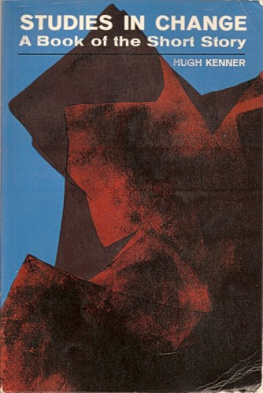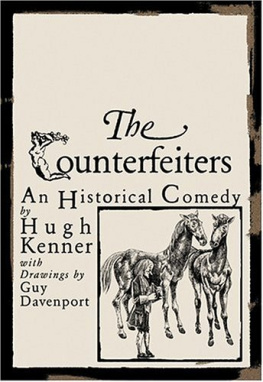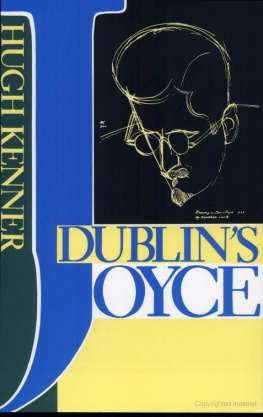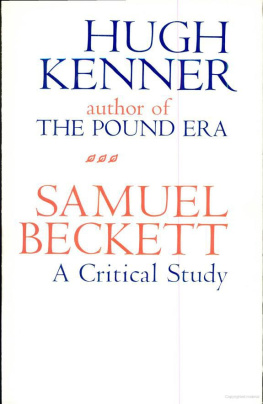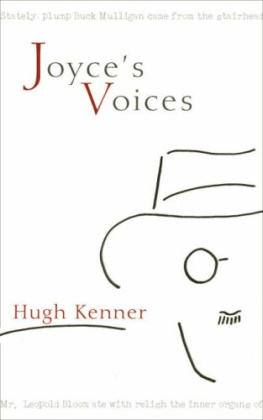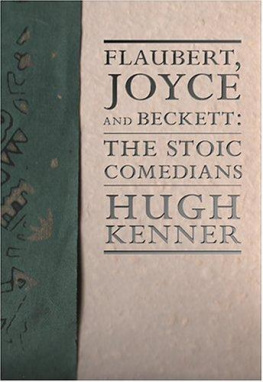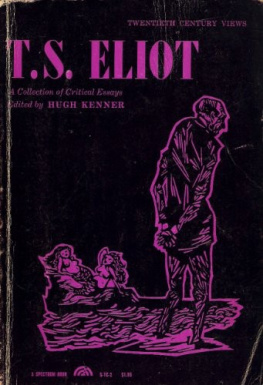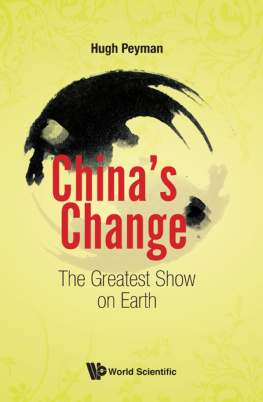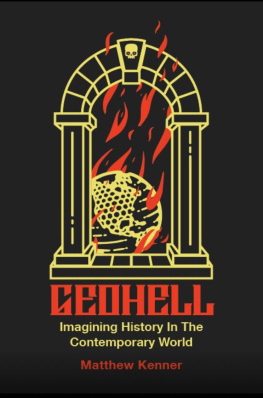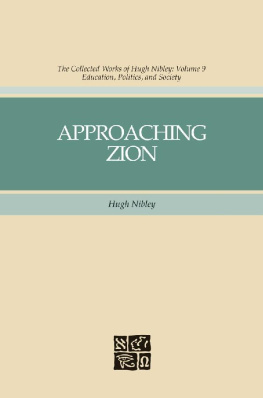Hugh Kenner - Studies in Change
Here you can read online Hugh Kenner - Studies in Change full text of the book (entire story) in english for free. Download pdf and epub, get meaning, cover and reviews about this ebook. year: 1965, publisher: Prentice-Hall, genre: Detective and thriller. Description of the work, (preface) as well as reviews are available. Best literature library LitArk.com created for fans of good reading and offers a wide selection of genres:
Romance novel
Science fiction
Adventure
Detective
Science
History
Home and family
Prose
Art
Politics
Computer
Non-fiction
Religion
Business
Children
Humor
Choose a favorite category and find really read worthwhile books. Enjoy immersion in the world of imagination, feel the emotions of the characters or learn something new for yourself, make an fascinating discovery.
- Book:Studies in Change
- Author:
- Publisher:Prentice-Hall
- Genre:
- Year:1965
- Rating:5 / 5
- Favourites:Add to favourites
- Your mark:
- 100
- 1
- 2
- 3
- 4
- 5
Studies in Change: summary, description and annotation
We offer to read an annotation, description, summary or preface (depends on what the author of the book "Studies in Change" wrote himself). If you haven't found the necessary information about the book — write in the comments, we will try to find it.
Studies in Change — read online for free the complete book (whole text) full work
Below is the text of the book, divided by pages. System saving the place of the last page read, allows you to conveniently read the book "Studies in Change" online for free, without having to search again every time where you left off. Put a bookmark, and you can go to the page where you finished reading at any time.
Font size:
Interval:
Bookmark:
A Book of the Short Story
-i-
Maynard Mack, Editor
PRENTICE-HALL INTERNATIONAL, INC., London
PRENTICE-HALL OF AUSTRALIA, PTY., LTD., Sydney
PRENTICE-HALL OF CANADA, LTD., Toronto
PRENTICE-HALL OF INDIA (PRIVATE), LTD., New Delhi
PRENTICE-HALL OF JAPAN, INC., Tokyo
PRENTICE-HALL DE MEXICO, S.A., Mexico City
-ii-
Hugh Kenner Professor of English University of California Santa Barbara
A Book of the Short Story
PRENTICE-HALL, INC. ENGLEWOOD CLIFFS, N.J.
-iii-
1965 by Prentice-Hall, Inc., Englewood Cliffs, N.J.
All rights reserved. No part of this book may be reproduced in any form, by mimeograph or any other means, without permission in writing from the publishers.
Library of Congress Catalog Card No.: 65-10148
Printed in the United States of America
[85844-C]
-iv-
NARRATIVE, the recital of a chain of happenings, has held the Western imagination since Homer the Singer of Tales: it is the oldest creative use of language of which record remains. Five of us (says Odysseus) drove the smoking pole down into the Cyclops' eye; and as my weight bore it down they twisted it to and fro, as shipwrights drill a timber, till his eye's blood boiled up around the burning wood, and his eyestrings crackled in the heat....--a sailor's tale, told in port. Or the hunter in the Grettir Saga tells how he knocked off balance the bear at the cliff edge, lopping one of its paws with his axe. A tale is a thing told; tale and tell are nearly the same word; there are marvels in the world, says the tale-teller, which, having known them, I can bring before your mind, if you will surrender yourself to my voice. My voice shall be your summons to belief. I shall relive the thing again in the telling, and shall talk as I relive it, and it shall be as if I were making the words up as I go along. I shall make you see what I see, and feel what I feel; we shall be astonished together, terrified together, valorous together. I shall submit myself again, for your enjoyment and my own, to dangers once already undergone (do not tax me with being a great liar), and no one, when we come past the crisis of the tale, shall see the Cyclops safely blinded, or the bear disabled, with more relief than I. Once upon a time....
His art, in tavern or bivouac, by a small night fire or on the deck of a ship, wherever men have time to kill and attention to divert, is always the same: to unite our imaginations, instant by instant, with events made real. His art is at the core of the story-writer's art; but the short story is something different. Story is nearly the same word as history: a methodical record, something with system to it, very likely not told but written down; and the writing reread, and revised and improved. In it, happenings are related--but more than that, something is examined. Many a short story, but no tale, is a kind of case history. The genre as we understand it today was developed within a century or less,
-v-
in a time of careful recording. Its authority is no longer the narrator's voice, but the relevance of a set of facts.
We can see its elements in Samuel Johnson "Ned Druggett" ( 1758), which compresses two stories into a mere thousand words. The stories are told simultaneously. They comprise the same events, rotate about the same man, and are told, moreover, in the same words. One is the success story of a remnant dealer who by courtesy, diligence, and application--good mercantile virtues--rises unspoiled to prosperity and a country house. The other is a tale of mounting and pathetic illusion. Ned's friends in the old days would see him take his only recreation, which was "to stand at his own door and look into the street," for he was putting every penny into the business. And when he has grown rich enough to go some hours every week to his lodging in the country, knowing that "when a man advances in life he loves to entertain himself sometimes with his own thoughts," then to his old friends he recommends the pleasures of Meditation, for he has been "all the morning at the window, counting the carriages as they passed before him."
Ned has ended substantially where he began, only more prosperous and more deeply entoiled in illusion. This second story is one that can be told of him, but it is not one that he would be in a position to tell, for it never occurs to him to doubt that he is happy. Johnson, moreover, tells it in such a way that not a word of his account would offend or disillusion Ned. He does not hint or wink, however; he tells it, firmly and clearly, to anyone sensitive to the notation of his careful prose, from the moment when, informing us that in his penurious days Ned's only recreation was to look into the street, he places an enhancing capital letter on Recreation. A few lines later, we are told that Ned's reputation soon extended "from one end of the street to the other" in exactly the tone, and exactly the form of words, that would speak of fame spreading from China to Peru. Careful phrase by careful phrase the chronicle proceeds, rehearsing only facts, but balancing Ned's view of them against another view, until we are ready to respond to the rich tragicomedy of the climax. This climax is contained in eight deliberate words, epitome of a life forever managed, forever kept prudently free of impulse, ardor, rashness, joy: "But at last he resolved to be happy." Everything else in Ned's life it has been plausible, nay admirable, that he should make resolutions about, but not this. The resolved happiness occupies a single paragraph, pregnant with paradoxes Johnson is too scrupulous to underline--the fresh air, and the closed window; quiet and contemplation, and elevation to the highest dignities of a Shopkeeper; the pleasures of Meditation, and the counting of carriages; and not least, the pleasures of meditation, and Ned's need to convince invited guests that these pleasures are real, and that he really experiences them.
As in the tale, every sentence is made up of facts: things said, things
-vi-
done. But the Story invites us, indeed, unless we are going to find it pointless, requires us, to consider how differently people may value the same set of facts. This is perhaps the minimum formula for the short story, that it is concerned with how experiences are valued: not merely what was said and done, but what difference it made to someone. Men move through affairs they only partly understand, says the story-writer; I narrate this affair as carefully as I can, so that you can see why it matters: what someone learned or failed to learn, felt or did not feel, saw or failed to see; and you who read, if you read well, will at the end understand better than anyone; better even, perhaps, than I.
It follows that the short story has no set form, no set procedure. It may use a show of careful documentation, or it may not even tell us the principal character's name. It may start with setting, or with action, or with conversation. It may end when activity ends, or it may meditate after the ending of activity. The real action may commence in the reader's mind, after he has lifted up his eyes from the last words on the last page. The contract between reader and writer is simple and contains only two clauses. The writer will import no irrelevancies, the reader will give his undivided attention. These are, of course, complementary stipulations.
James Joyce, who wrote only fifteen short stories before he abandoned the form forever at twenty-five, pared off irrelevances by so heroic an effort that one could learn almost the whole discipline of responsive reading from the text of
Font size:
Interval:
Bookmark:
Similar books «Studies in Change»
Look at similar books to Studies in Change. We have selected literature similar in name and meaning in the hope of providing readers with more options to find new, interesting, not yet read works.
Discussion, reviews of the book Studies in Change and just readers' own opinions. Leave your comments, write what you think about the work, its meaning or the main characters. Specify what exactly you liked and what you didn't like, and why you think so.

